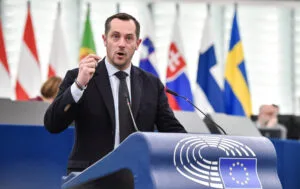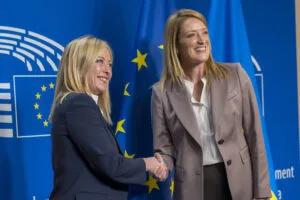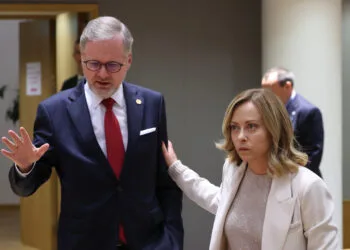Brussels – These are hectic weeks in the halls and corridors of the European Parliament in Brussels, with national delegations and political groups intensifying their work and contacts to define the real balance of power in the upcoming legislature. This is how the European Conservatives and Reformists (ECR) group managed to become the third largest in the European Parliament today (June 19), undermining Renew Europe. However, if—for the first time—the conservative right takes the lead in the head-to-head with the European liberals, the math will only be done at the end. Or rather, at the inaugural plenary session in Strasbourg on July 16–19, when the 720 MEPs will sit on their respective benches, and the political groups will be able to get their exact weight measured in the hemicycle.

However, the numbers say that the ECR group has grown to 83 members, admitting 11 new MEPs. They are the Danish Kristoffer Storm of the Danish Democrats (DA), the Bulgarian Ivaylo Valchev of There is Such a People(ITN), the Lithuanian Aurelijus Veryga of the Union of Peasants and Greens of Lithuania (Lvžs), the Romanians Claudiu-Richard Tarziu, Gheorghe Piperea, Maria-Georgiana Teodorescu, Adrian-George Axinia and Serban Dimitrie Sturdza from the Alliance for the Union of Romanians (AUR) and the French Marion Maréchal, Guillaume Peltier and Laurence Trochu, all three ex-Reconquête and ready to found a new conservative nationalist formation (along with Nicolas Bay, already member of ECR since February) after expulsion from the party due to internal controversy before early elections in France. These 11 MEPs join the four who joined the group last Wednesday (June 12): the Croatian Stjepo Bartulica of Patriotic Movement (DP), Cypriot Geadi Geadis of the National Popular Front (ELAM), Latvian Reinis Poznaks of the United List (AS), and Luxembourger Fernand Kartheise of the Reformist Party of Democratic Alternative (ADR).

ECR, which had initially obtained 73 seats in the June 6-9 European elections, showed some confusion in communicating admissions numbers. The figure released on June 12 on the 77 total members “did not take into account the political changes that took place in France,” patches up the group in a note, adding that “due to the fact that some members had to be readmitted [5, ed.]” the number of 83 MEPs confirmed today “appears to be lower than what a reader might expect from the last press release.” Now, the constituent meeting of the ECR group is expected to take place next Wednesday (June 26), when the chair will be elected. “My role is to organize the alternative front to the left,” Italy’s Prime Minister and chair of the ECR Party, Giorgia Meloni, said in Milan. “I think some surprises could come about the majorities built on the various dossiers in the European Parliament.”
After the announcement of the ECR group, the reaction of liberals in the EU Parliament is immediate. “It’s absolutely premature; also, Renew Europe has ongoing negotiations with other forces,” sources inside the group told LaPresse news agency. “The race has started, it does not end today, we are well trained and we will see who comes best in the end, as true liberal democrats we like competition very much.” To date, the Renew Europe group has 80 seats, but it has been in talks for days with some newly elected members and others spilling over from the other European political families, including Belgian Yvan Verougstraete of Les Engagés, a member of the French-speaking liberal party who has just withdrawn from the European People’s Party (EPP) group and expressed interest in joining the liberal family in the EU Parliament.
English version by the Translation Service of Withub









